In the world of corporate culture, which moves at a breakneck speed, businesses need tools that help them manage their finances, make reports, and ensure tax compliance. Corporate accounting software is one of the key pillars of proper financial management. These platforms simplify day-to-day accounting while equipping businesses with strategic insight to generate better insights on their financial decisions.
If you are a midsize or large enterprise, the right accounting solution will help you keep away from mistakes, reduce manual labor, and scale operations so that they can be executed fast and efficiently. When there are so many universities advertising their various skill sets and eligibility criteria for master’s degrees in accounting software programs, deciding on the best program can be really challenging. With this list, we rank the top 10 outstanding corporate accounting software solutions for the year 2025. From the entry-level software to the more sophisticated with automation and AI-powered insights, we break down their features, pros, cons, and pricing to make your choice easier.
What is Corporate Accounting Software?
Corporate accounting software is essentially considered to be the infrastructure of accounting, which must maintain accurate and updated financial records, comply with relevant laws, restrictions, accounting standards, simplification of bookkeeping, and reporting requirements. Here are some major software components of corporate accounting software:
- Automation: Some tasks are monotonous and are in need of automation: entering data, issuing invoices, and doing the payroll. They consume time, which can be better utilized elsewhere.
- Scalable: It meets growing business needs, including integrating with others and storing large sets of data.
- Compliance Management: It abides by accounting with financial regulations and taxation policies.
- Multi-user Access: Permits teams to work with the solution simultaneously with different levels of permissions.
- Financial Reporting: Generates reports and dashboards for auditing and analyzing for strategic decision-making.
Key Features of Corporate Accounting Software
When selecting an accounting system, companies should look for features that serve particular operational needs. Here are some of the most important features to consider:
- Customizable dashboards: Give a real-time overview of financial status with interactive features.
- Third-party integrations: Enable connectivity with payroll, CRM systems, and inventory management systems for seamless working.
- Cloud access: Access data anywhere at any time, encouraging flexibility and working from home.
- Bank reconciliation: Matches transactions automatically to reduce errors and manual work.
- Security protocols: Encryption and backup mechanisms protect sensitive financial data in case of unauthorized access and accidental loss, respectively.
Comparison Table for Corporate Accounting Software
| Software Name | Rating | Website URL | What Makes It Unique |
| QuickBooks | 4.5/5 | https://quickbooks.intuit.com | User-friendly and integrates with 150+ apps |
| Wave Accounting | 4.3/5 | https://www.waveapps.com | Free software with strong UX and templates |
| FreshBooks | 4.4/5 | https://www.freshbooks.com | Strong mobile experience and easy invoicing |
| Sage 50 Premium | 4.2/5 | https://www.sage.com | Cloud access with multi-level features |
| Cougar Mountain | 4.0/5 | https://www.cougarmtn.com | Handles unlimited inventory and user scalability |
| AccountEdge Pro | 4.1/5 | https://www.accountedge.com | Modular system tailored for small businesses |
| Xero | 4.6/5 | https://www.xero.com | Over 450 integrations and 24/7 support |
| CheqBook | 4.0/5 | https://www.cheqbook.com | Training and daily backups for security |
| Kashoo | 4.2/5 | https://www.kashoo.com | Beginner-friendly with simple learning curve |
| Zoho Books | 4.5/5 | https://www.zoho.com/books | Client portal and automation features |
Top 10 Corporate Accounting Software
1. QuickBooks
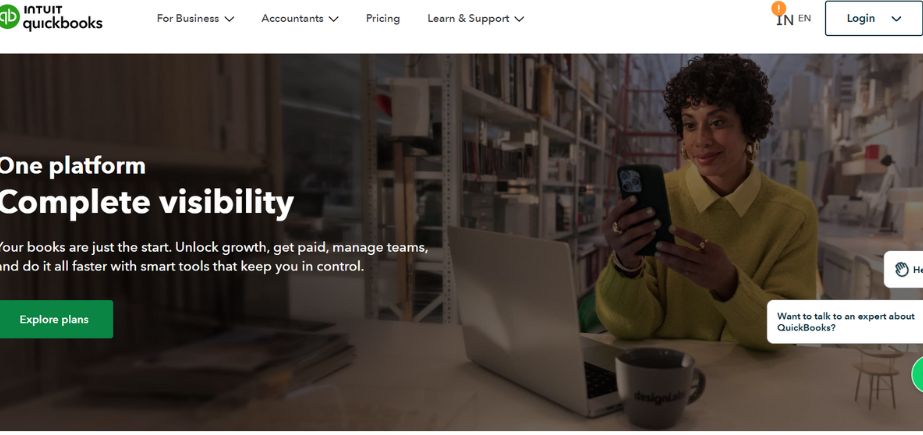
Type: Cloud-Based
Rating: 4.5/5
Website: https://quickbooks.intuit.com
Bulk Excel imports to QBO: If you are moving corporate data from Excel or CSV into QuickBooks, a bulk import tool (for example, SaasAnt) can reduce manual copy-paste during setup or cleanup.
Included among the best cloud accounting software for freelancers, small businesses, and growing entities, QuickBooks is known for its intuitive interface and massive third-party app support. It can do many things-from managing payroll to inventory, billing, and tax filing. What gives it the competitive edge in the market is due to Auto-Invoicing, Financial Reporting, Mass Payment, Multiple Device Access; basically, it gets the money. It is excellent for the price, but has some customers complain about the slow customer support and lack of industry-specific modules. It would be suitable for someone looking for a small, scalable, and very affordable solution.
Key Features: Easy dashboard, app integrations, basic reporting, invoice automation, multi-device access
Pros: Affordable pricing, scalable features, great for freelancers
Cons: Limited advanced tools, slow customer service, lacks industry-specific modules
Pricing: Starts at ₹1,999/year
2. Wave Accounting
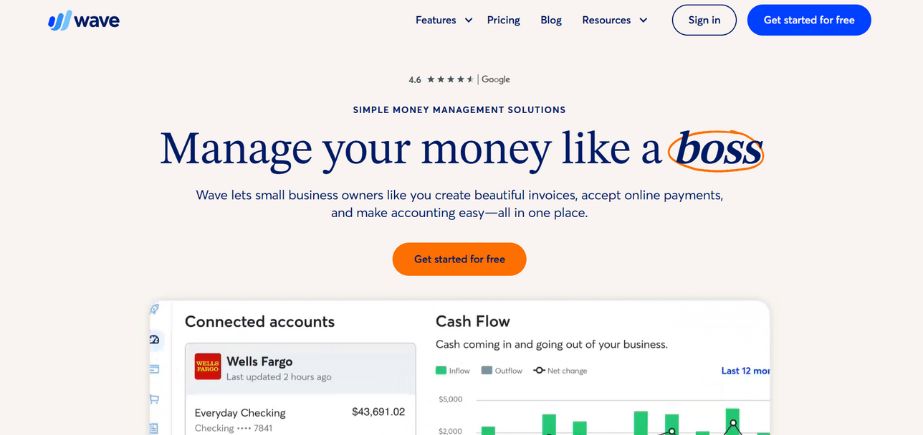
Type: Cloud-Based (Free)
Rating: 4.3/5
Website: https://www.waveapps.com
Wave Accounting is a great choice for the freelancer and small business crowd, as it is completely free and offers a powerful cloud-based platform. The startup is quick, supporting email invoicing, auto-sync, and template features. Cloud backup and a simple interface give much ease in accounting; however, ads greet you as support requires payment. It’s an excellent option for those who want the essentials without a price tag. While payroll and advanced features are what it lacks, the accessibility and zero price are huge wins for it.
Key Features: Auto sync, templates, cloud backup, email invoicing, simple dashboard
Pros: Free access, easy to use, decent features
Cons: Ads present, no payroll, support behind paywall
Pricing: Free (paid add-ons available)
3. FreshBooks
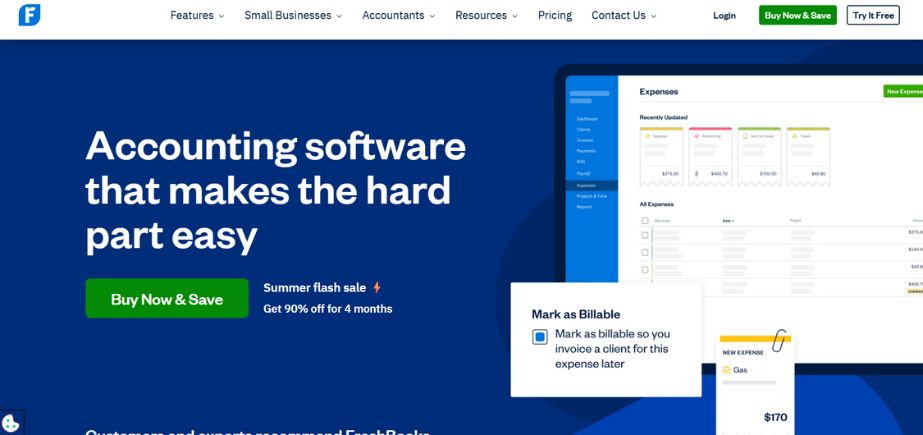
Type: Cloud-Based with Mobile App
Rating: 4.4/5
Website: https://www.freshbooks.com
FreshBooks is a cloud-empowered accounting software with a strong mobile appeal, best for owners who prefer working out of the home. Users can send invoices, track time, and expenses from their mobile phones or desktops. FreshBooks excels with usability since the interface is sleek, and customer support is very responsive. But mobile users might be a little bummed missing a few features that are pristine on the desktop. The premium plans can be expensive, and payroll tools are somewhat limited unless you upgrade. Best for freelancers and service-based professionals.
Key Features: Mobile invoicing, time tracking, customer chat, visual reports, dashboard
Pros: Mobile-friendly, great UI, strong support
Cons: Mobile limitations, pricey premium plans, no payroll in the base version
Pricing: From ₹760/month
4. Sage 50 Premium
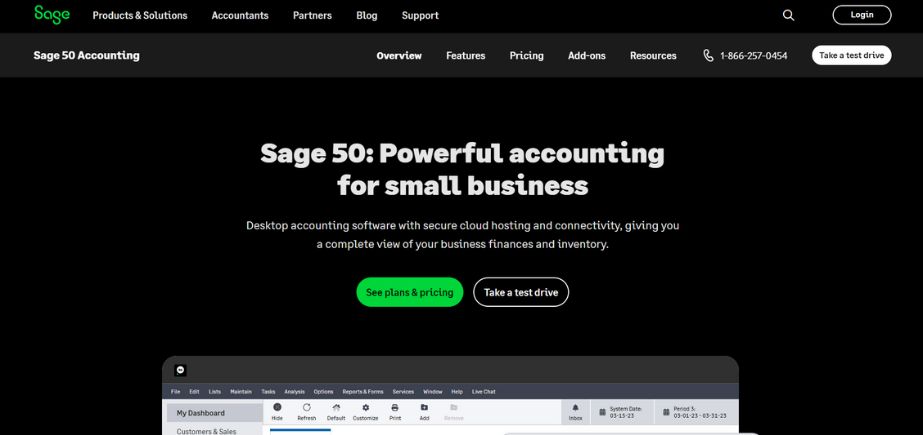
Type: Hybrid (Desktop + Cloud)
Rating: 4.2/5
Website: https://www.sage.com
Sage 50 Premium blends the trust of a desktop with a cloud backup opportunity, with which growing businesses have a safe and robust set of tools. It is excellent for medium enterprises with complex payroll, inventory management, and security needs. This software provides customizable forms and reliable financial reports. Though very powerful, it comes with an outdated interface and a learning curve steep enough for first-time users. Generally more expensive, though, it is worth every penny when you need to control every aspect of your accounts.
Key Features: Cloud storage, multiple tiers, strong security, payroll tools, document templates
Pros: Secure, good for SMBs, flexible features
Cons: Outdated UI, difficult onboarding, higher cost
Pricing: Starts at ₹20,000/year
5. Cougar Mountain
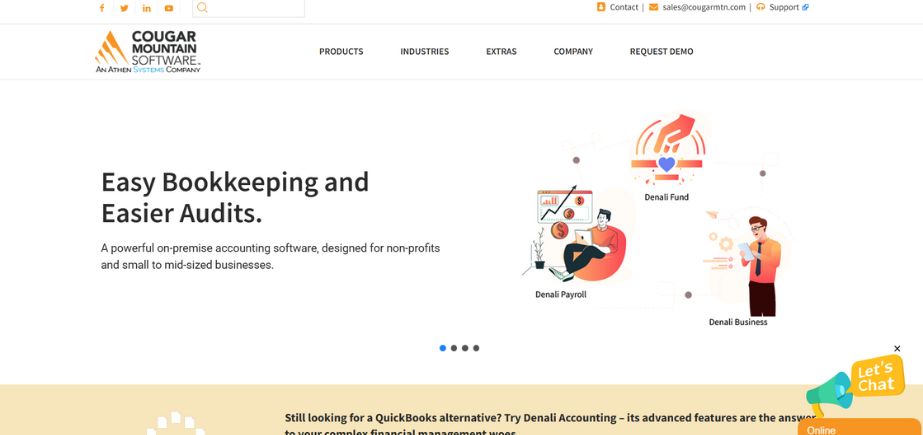
Type: Desktop-Based
Rating: 4.0/5
Website: https://www.cougarmtn.com
Cougar Mountain is a full-fledged desktop accounting application for inventory-laden businesses. This software comprises modules for batch processing, audit trails, and vendor control, thereby allowing highly detailed costing and financial tracking. Multi-user capability and strong support make it appropriate for medium-sized establishments. However, it cannot be cloud-based and has a complex pricing model. Users often gripe about its old-fashioned interface; however, the interface design issues are more than compensated for by the software’s depth of functionality.
Key Features: Inventory tracking, batch processing, audit trail, user controls, vendor management
Pros: Extensive tools, scalable, experienced support
Cons: Extra costs for modules, complex UI, not cloud-native
Pricing: Custom pricing (modular)
6. AccountEdge Pro
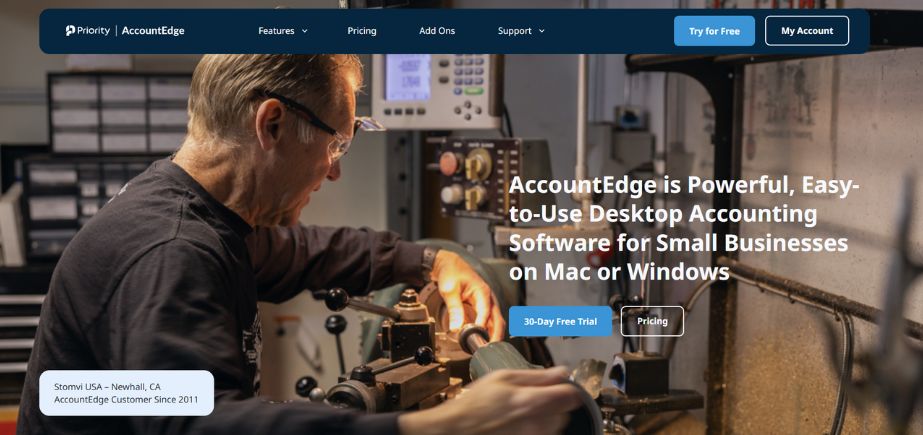
Type: Desktop-Based
Rating: 4.1/5
Website: https://www.accountedge.com
AccountEdge Pro is a desktop accounting solution customized for small businesses that want offline accounting software. It covers basic features such as payroll, bank feed, budgeting, and customer management. The interface is simple and reliable, which tends to favor Windows users and lacks cloud connectivity. Without any app integration, it is a closed program ideal for companies with the least technical dependency. Upgrades are somewhat sparse, but it does well for barebones offline needs.
Key Features: Bank feeds, budgeting, payroll processing, customer database, reporting tools
Pros: All-in-one package, stable, easy navigation
Cons: No cloud version, limited upgrades, Windows-focused
Pricing: Starts at ₹11,000/year
7. Xero
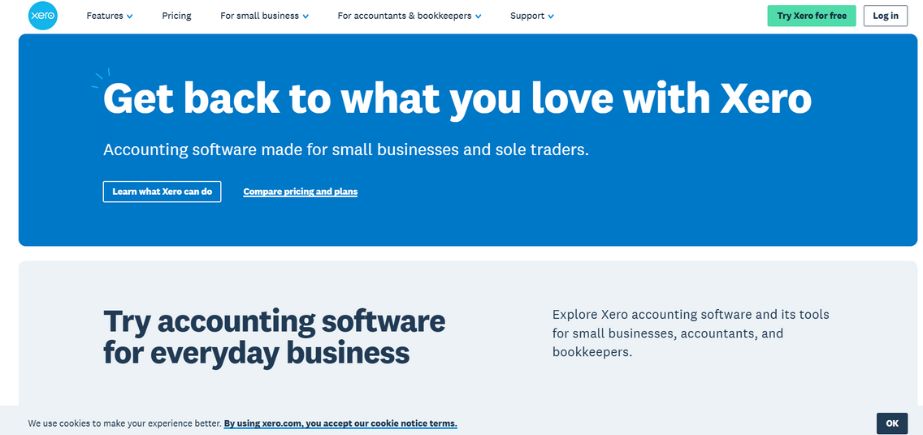
Type: Cloud-Based
Rating: 4.6/5
Website: https://www.xero.com
Xero is a cloud accounting powerhouse, bearing its name with the abilities of scaling and automation. It offers more than 450 third-party integrations, making it suitable for startups and growing companies. With Xero, one can log bank accounts, report live, calculate tax, and send bulk invoices. It pays attention to agile businesses, with its 24/7 customer support and regular updates. While a slight learning curve and its premium pricing might be coming up against you, it does offer really good value for money for features and automation.
Key Features: 450+ apps, bank sync, live reporting, tax management, bulk invoicing
Pros: Highly scalable, solid support, auto-updates
Cons: Can get expensive, limited customization, slight learning curve
Pricing: From ₹720/month
8. CheqBook
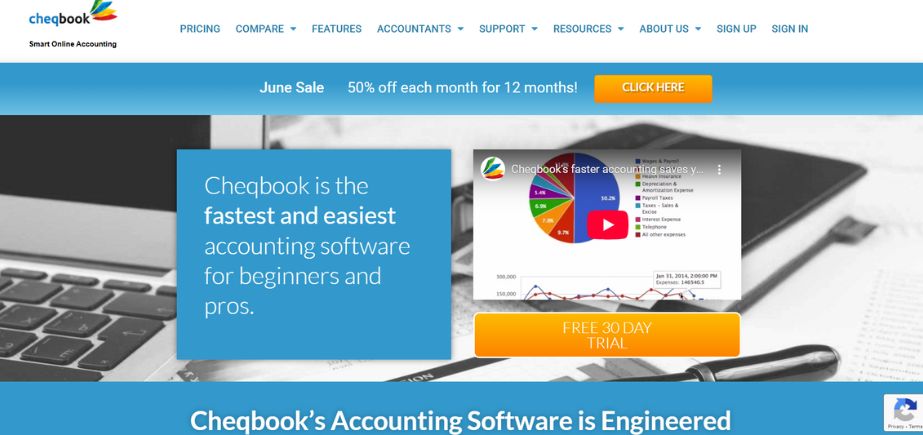
Type: Cloud-Based
Rating: 4.0/5
Website: https://www.cheqbook.com
CheqBook is a cloud-based tool offering simplicity, security, and user learning. It is beginner-friendly and reliable, with automatic backups and educational resources such as webinars. The UI is simple but might appear too dull for advanced users. CheqBook has all the features for invoicing, bank syncing, and secure login, which makes it an excellent choice for small business owners who value the highest level of safety and ease of use. However, integrations are minimal, but a 60-day money-back guarantee gives the user confidence in using it.
Key Features: Backups, learning tools, bank sync, invoicing, secure login
Pros: Safe to use, helpful training, 60-day return policy
Cons: Fewer integrations, plain UI, basic feature set
Pricing: From ₹650/month
9. Kashoo
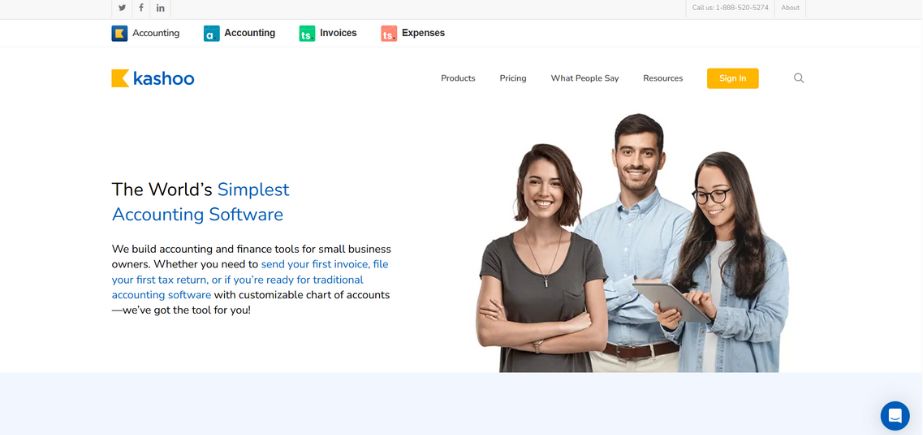
Type: Cloud-Based
Rating: 4.2/5
Website: https://www.kashoo.com
Kashoo is a very easy-to-use online accounting software for those wanting to manage their finances without a steep learning curve. With a smart categorization system, a clean dashboard, plus email responsiveness, bookkeeping is a breeze. Kashoo is limited in report types and integrations, but those limitations do not affect the functioning of this accounting software for sole proprietors or micro-businesses that want a bare-bones accounting tool. Kashoo essentially is a kick-starter for digital accounting because of its trial offer and even pricing.
Key Features: Easy dashboard, smart categorization, trial period, invoice templates, email support
Pros: Very easy to learn, centralized data, good support
Cons: Few integrations, limited reports, best for small businesses only
Pricing: From ₹600/month
10. Zoho Books
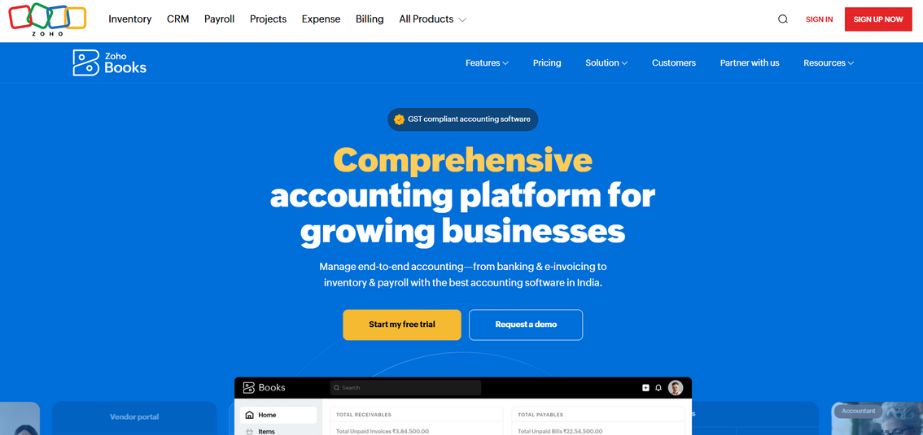
Type: Cloud-Based
Rating: 4.5/5
Website: https://www.zoho.com/books
Zoho Books stands for an advanced cloud-based accounting tool built for automation and collaboration. It includes a client portal, task management, plus integrations with other Zoho apps. Businesses receive real-time updates and keep their books from any device. The UI can annoy a beginner from the very beginning, and some advanced functionalities come only when buying an upgraded form. So it does become a cool pick after considering its automation potentials, mobile compatibility, and well-structured dashboard, aimed at tech-savvy professionals and budding teams.
Key Features: Client portal, task automation, mobile-friendly, integrations, dashboard
Pros: Great mobility, automated tools, client feedback options
Cons: Slightly complex UI, advanced features are paid, learning curve
Pricing: From ₹700/month
Conclusion
A proper corporate accounting software choice will enhance how your business manages finances. From the automation of routine tasks to real-time updates on company finances, these accounting tools make the finance team more productive and compliant. Some organizations might choose to keep it simple and go for the free tools like Wave, while others may require something more sophisticated from Xero or Sage. It all boils down to the size of your company, the complexity of its operations, and the budget.
Any of the top 10 software reviews here can lend confidence to businesses while they manage their accounts and stay compliant, while also enabling them to make informed decisions. Hence, choose the right corporate accounting software today that can ease out your business operations and set free your financial potential.
FAQs
Which corporate accounting software is best for large businesses?
Xero and Sage 50 Premium are excellent for large businesses because of their scalability and superior features.
Is there a free corporate accounting application available?
Yes, there is, with Wave Accounting providing a free plan for small businesses and startups.
What is the most mobile-friendly accounting software?
FreshBooks has a very good mobile application, well-suited for business owners on the move.
Can I integrate payroll into corporate accounting software?
Many of them, including QuickBooks and Sage, currently offer integrated solutions through either a built-in payroll scheme or third-party payroll integration.
Is cloud-based accounting software secure?
Most modern platforms, such as Zoho Books and Xero, employ high-level data security mechanisms, including encryption, backups, and user controls.

